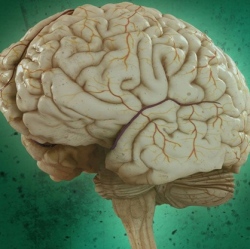
A commonly prescribed antidepressant can reduce production of the main ingredient in Alzheimer’s brain plaques, according to new research at Washington University School of Medicine in St. Louis and the University of Pennsylvania. The findings, in mice and people, are published May 14 in Science Translational Medicine.
They support preliminary mouse studies that evaluated a variety of antidepressants. Brain plaques are tied closely to memory problems and other cognitive impairments caused by Alzheimer’s disease. Stopping plaque buildup may halt the disastrous mental decline caused by the disorder.
The scientists found that the antidepressant citalopram stopped the growth of plaques in a mouse model of Alzheimer’s disease. And in young adults who were cognitively healthy, a single dose of the antidepressant lowered by 37 percent the production of amyloid beta, the primary ingredient in plaques.
Although the findings are encouraging, the scientists caution that it would be premature for people to take antidepressants solely to slow the development of Alzheimer’s disease.
